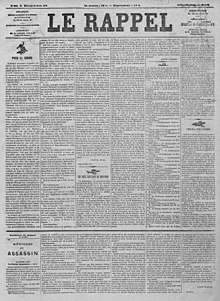Pour la Serbie
"Pour la Serbie" (For Serbia) is a speech written by Victor Hugo, on 29 August 1876, castigating massacres perpetrated by the Turks. It was published in the French newspaper Le Rappel, later included in the last volume of Actes et Paroles, Hugo's collected political writings, entitled Depuis l'exil.[1]

Content
During 1876, the Ottoman harsh suppression of the uprisings of Balkan Christians, specifically, the atrocities in Bulgaria, had been witnessed by Western observers and fully reported in the European press with gruesome details.[2] The Turks had very few regular troops and therefore used irregular Bashi-bazouks who used methods of the utmost violence. When the full extent of the massacres became known, a very strong public reaction against the Ottoman Empire occurred.[3] In this text, Hugo delivers a plea protesting against the impassivity of European governments, in particular in the face of the massacre committed by the Turks in Serbia.[4]
Here is a fact: a nation is being murdered. Where? In Europe. Are there any witnesses? One witness, the whole world. Do governments see it? No.
Hugo's eloquent appeal is calling European governments to take action, and people to raise their voices in universal indignation. This speech is considered as one of the founding acts of the European idea.[5][6]
What is happening in Serbia demonstrates the necessity for a United States of Europe. May disunited governments be succeeded by united peoples. Let us be finished with murderous empires. Let us muzzle fanaticisms and despotisms. . . No more wars, no more massacres, no more carnage; free-thought; free trade; fraternity...What the atrocities of Serbia place beyond doubt is that Europe needs a European nationality, a single government, an immense fraternal arbitration, democracy at peace with itself... In a word, a United States of Europe. There lies the goal, the haven.
— Victor Hugo, Pour la Serbie (1876), [7]
References
- Bradley Stephens (2019). Victor Hugo. Reaktion Books. p. 213. ISBN 978-1-78914-111-5.
- MacGahan, Januarius A. (1876). Turkish Atrocities in Bulgaria, Letters of the Special Commissioner of the "Daily News,". London: Bradbury Agnew and Co.
- Barbara Jelavich (1983). History of the Balkans:. Cambridge University Press. p. 354. ISBN 978-0-521-27458-6.
- Marieke Stein (2007). Victor Hugo orateur politique, 1846-1880 (in French). Champion. ISBN 978-2-7453-1448-2.
- "Bicentenaire de Victor Hugo (1802-2002) - Sénat, French Government". www.senat.fr.
- Florence Chaltiel (2006). Naissance du peuple européen (in French). Odile Jacob. p. 25. ISBN 978-2-7381-1843-1.
- Lawrence D. Kritzman (2007). The Columbia History of Twentieth-century French Thought. Columbia University Press. p. 231. ISBN 978-0-231-10790-7.
Further reading
- Victor Hugo (2018). Actes et Paroles. Seltzer Books. ISBN 978-1-4553-4287-7.CS1 maint: ref=harv (link)
- Graham Robb (1999). Victor Hugo. W.W. Norton & Company. ISBN 978-0-393-31899-9.CS1 maint: ref=harv (link)
External links
| French Wikisource has original text related to this article: |
- For the speech in full, see: Pour la Serbie (in French), Za Srbiju (in Serbian).